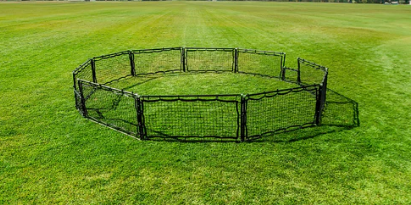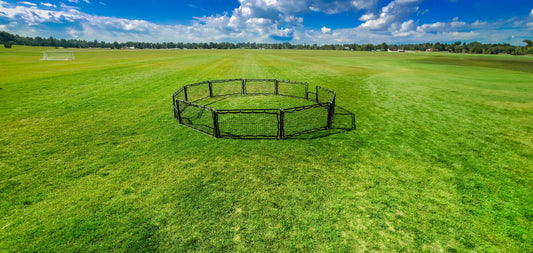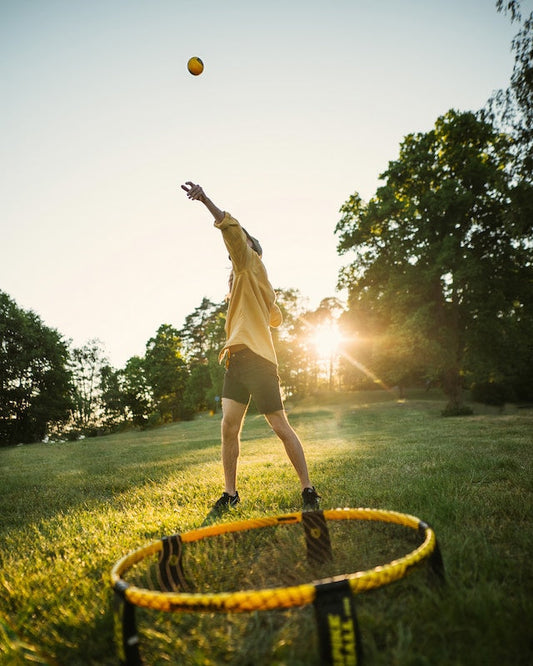Physical education (PE) games for preschoolers are crucial in their holistic development, serving as a vital component of early childhood education. Here’s how these activities contribute across various domains:
- Physical Growth: PE games for preschoolers provide a rich environment for children to practice essential movements like running and jumping. These activities enhance gross motor skills, coordination, and balance, critical for their ongoing physical development.
- Cognitive Advancement: Beyond physical activity, these games stimulate cognitive growth. A Preschooler learns to follow instructions, make decisions, and develop strategies, enhancing their problem-solving skills and spatial awareness.
- Social Skills: Engaging in PE games fosters essential social interactions, teaching kids the importance of cooperation, communication, and empathy. These games are excellent teacher resources for promoting teamwork and social etiquette within PE class.
- Emotional Well-being: Active play offers preschoolers a healthy outlet for expressing emotions, helping them build resilience and learn emotional regulation, an important aspect of their emotional growth.
- Linguistic Development: PE class becomes a dynamic setting for language development as children learn new vocabulary related to movements and sports, enriching their communication skills.
- Confidence and Self-esteem: Success in PE activities boosts preschoolers' self-esteem, encouraging them to tackle new challenges with confidence.
- Lifelong Health: Introducing the concept of physical activity through PE games instills the importance of a healthy lifestyle from an early age, a crucial lesson for every kid.
- The Joy of Play: Ultimately, PE games embody the pure enjoyment of play, providing joy, laughter, and a sense of wonder, making them a foundational part of a PE teacher's resources.
These benefits highlight why PE games are more than just play; they're an integral part of nurturing well-rounded individuals. Below, we introduce engaging PE games that offer these comprehensive developmental advantages, perfect for any PE teacher looking to enrich their preschoolers' PE class experience. Same of these games can cross the line between older kids and young kids offer a more dynamic experience.
If you are looking for additional equipment to help run some of these activities, find them here.

Simon Says - The game Simon Says offers numerous benefits for a child's development, encompassing physical, cognitive, social, and emotional aspects. This is a very dynamic game for large or small groups.
- Listening and Following Instructions: Simon Says requires active listening skills, as children must carefully pay attention to the leader's commands. Following instructions correctly encourages improved listening and comprehension skills.
- Cognitive Skills: The game stimulates cognitive development as children process verbal cues, make quick decisions, and execute actions accordingly. It promotes critical thinking and enhances memory and attention span.
- Body Awareness and Coordination: Simon Says involves physical movements, such as touching body parts or performing specific actions. This helps children develop body awareness and improves their gross motor skills and coordination.
- Self-Control and Impulse Regulation: In Simon Says, children must resist acting on commands without the phrase "Simon says." This cultivates self-control and impulse regulation as they learn to think before they act.
- Turn-Taking and Patience: The game encourages children to wait for their turn and listen for their name before responding. This fosters patience and teaches the importance of taking turns in a group setting.
- Social Interaction: Playing Simon Says promotes social interaction and cooperation. Children engage in group activities, follow the same rules, and share the experience of play, fostering positive peer interactions.
- Emotional Expression: As children participate in the game, they may experience excitement, anticipation, or disappointment when they make a mistake. Simon Says provides an opportunity for emotional expression and learning to manage different feelings.
- Boosting Confidence: Successfully following commands in Simon Says builds a child's confidence and sense of accomplishment. Positive reinforcement from peers and adults contributes to a child's self-esteem.
- Creativity and Imagination: As the leader (Simon) comes up with different actions, the game encourages creativity and imaginative play. Children may also enjoy taking turns as the leader, inventing new commands for their friends.
- Engaging Fun: The playful nature of Simon Says makes it an enjoyable and entertaining activity for children. Engaging in fun activities encourages enthusiasm for learning and exploration.

Gaga Ball - Gaga Ball provides numerous developmental benefits for each student, encompassing physical, social, emotional, and cognitive aspects.
- Physical Fitness: Gaga Ball is a fast-paced game that involves running, dodging, jumping, and striking the ball. The game promotes cardiovascular fitness, agility, hand-eye coordination, and overall physical strength.
- Motor Skills: Children improve their gross motor skills as they move, change direction, and strike the ball. These movements enhance their balance, spatial awareness, and body control.
- Reflexes and Reaction Time: The quick movements and unpredictable nature of the game challenge children's reflexes and reaction time, helping them develop quick decision-making skills.
- Social Interaction: Gaga Ball is typically played with a group of children in an enclosed pit. The game encourages social interaction, cooperation, and teamwork as children communicate, strategize, and engage with their peers.
- Sportsmanship: Children learn the importance of good sportsmanship, fairness, and respecting others during Gaga Ball. They practice accepting both victory and defeat gracefully.
- Conflict Resolution: Playing Gaga Ball may involve disputes or disagreements among players. The game presents opportunities for children to learn conflict resolution skills, problem-solving, and compromising.
- Confidence Building: Successfully participating in Gaga Ball, such as making successful strikes or avoiding getting hit by the ball, builds a child's confidence and self-esteem.
- Focus and Concentration: The fast-paced nature of the game requires children to stay focused and attentive, enhancing their concentration and ability to stay engaged in an activity.
- Inclusion and Belonging: Gaga Ball is inclusive and can be played by children of various ages, abilities, and skill levels. All players have an opportunity to join and enjoy the game, fostering a sense of belonging and inclusivity.
- Resilience: Children may experience moments of challenge or getting eliminated from the game. These experiences teach resilience and encourage children to keep trying and learning from setbacks.
- Enjoyment and Recreation: Above all, Gaga Ball is a fun and enjoyable game for children. Engaging in enjoyable physical activities helps children develop a positive attitude towards fitness and a lifelong appreciation for staying active.
“Head, Shoulders, Knees and Toes” - The game "Head, Shoulders, Knees, and Toes" is a classic and interactive activity that offers a range of developmental benefits for young children. This popular game involves singing a song while performing corresponding physical actions, touching the body parts mentioned in the song.
- Body Awareness: "Head, Shoulders, Knees, and Toes" promotes body awareness as children sing the song and touch the corresponding body parts. This activity helps them identify and recognize different body parts and their names.
- Language Development: Singing the song and repeating the body part names in rhythm enhances language development. Children learn new vocabulary and improve their pronunciation and articulation.
- Listening Skills: Children must listen carefully to the song's instructions and the sequence of body parts mentioned. This fosters active listening skills and comprehension.
- Gross Motor Skills: Performing the physical actions of touching the head, shoulders, knees, and toes requires gross motor skills. The game supports the development of coordination and balance.
- Following Directions: The song provides clear directions for the actions to be performed. Children learn to follow instructions and execute the movements in the correct order.
- Rhythm and Coordination: Singing the song while performing the actions helps children develop a sense of rhythm and timing. Coordinating their movements with the beat enhances their overall motor skills.
- Social Interaction: "Head, Shoulders, Knees, and Toes" is often played in groups or classrooms, encouraging social interaction among children. They can sing and perform the actions together, fostering camaraderie and cooperation.
- Fun and Engagement: The playful nature of the game makes it enjoyable for children. Engaging in fun activities like this promotes positive attitudes towards physical activity and learning.
- Emotional Expression: The game can evoke feelings of joy and excitement as children sing and move along to the song. It provides an outlet for emotional expression and creative play.
- Cultural Learning: "Head, Shoulders, Knees, and Toes" is a widely known and shared children's song in various cultures. Playing the game introduces children to diverse musical and cultural elements.
Tag - The game of tag, a timeless and beloved outdoor activity, provides numerous developmental benefits for children. As they run, chase, and strategize, children experience growth in various aspects of their physical, social, emotional, and cognitive development.
- Physical Fitness: Tag involves running, jumping, and dodging, promoting cardiovascular fitness, stamina, and overall physical health. Engaging in these active movements helps children develop their gross motor skills and coordination.
- Agility and Reflexes: The quick and sudden movements required in tag games enhance a child's agility, balance, and reflexes, improving their ability to react swiftly to changing situations.
- Spatial Awareness: Tag games take place in outdoor spaces, requiring children to navigate and be aware of their surroundings. This enhances their spatial awareness and helps them understand concepts like distance and direction.
- Endurance and Strength: Repeatedly running and engaging in physical activity during tag games builds a child's endurance and muscular strength.
- Social Skills: Tag is often played in groups, encouraging social interaction and cooperation. Children practice communication, negotiation, and taking turns while playing.
- Empathy and Emotional Regulation: In tag, children experience both being the chaser and the one being chased. This allows them to understand others' perspectives, developing empathy and emotional regulation as they handle various emotions during play.
- Sportsmanship: Tag games provide opportunities to learn sportsmanship and fair play. Children practice winning and losing gracefully, understanding that it's all part of the game.
- Problem-Solving: Tag requires strategy and problem-solving skills as children try to catch their peers or avoid being caught. They learn to think on their feet and adapt to different situations.
- Communication Skills: Tag games involve verbal and non-verbal communication. Children communicate with their peers through words, gestures, and eye contact to coordinate movements and strategies.
- Imagination and Creativity: Children often invent variations and rules within tag games, fostering imagination and creativity as they explore different ways to play.
- Inclusivity: Tag games can accommodate children of varying abilities and fitness levels, promoting inclusivity and allowing everyone to participate.

“Duck Duck Goose” - The game "Duck Duck Goose" is a delightful and active children's game that offers a range of developmental benefits. This simple yet engaging game aids in a child's overall development by promoting physical, social, emotional, and cognitive skills.
- Physical Fitness: "Duck Duck Goose" involves children sitting in a circle and taking turns running around to tag other players. This promotes physical fitness, agility, and gross motor skills.
- Coordination: The game requires running, tagging, and quick movements, improving a child's hand-eye coordination and balance.
- Social Interaction: The game fosters social interaction and cooperation as children sit together in a circle, communicate, and play with their peers.
- Turn-Taking: Taking turns to be the "goose" or the one doing the tagging encourages children to practice turn-taking and patience. As well as following instructions by remaining in the play area.
- Empathy and Emotional Regulation: When children are chosen as the "goose," they experience excitement and joy. When they are not chosen, they learn to cope with disappointment and practice emotional regulation.
- Communication Skills: Children communicate with each other during the game, using words like "duck" and "goose" to interact and participate.
- Listening Skills: Children must listen attentively as the person walking around the circle says "duck" or "goose" during the game.
- Decision-Making: When the "goose" is chosen, the child must make quick decisions on whom to chase, promoting decision-making skills.
- Inclusivity: "Duck Duck Goose" can include children of different ages and abilities, fostering inclusivity and a sense of belonging among all participants.
- Imagination and Creativity: As children play the game, they may create variations or come up with different ways to play, stimulating their imagination and creativity.
- Joy and Playfulness: "Duck Duck Goose" is a fun and playful game that brings joy and laughter to children, contributing to their emotional well-being.
PE games are vital for preschoolers, significantly impacting their development across physical, cognitive, social, and emotional domains, also seen in one of many related articles. Engaging young kids in games like musical chairs—a fun game and a staple of gym class—sets the stage for a lifetime of learning, healthy habits, and enriching social interactions. A PE lesson can play an important role in making a healthy connection and habit for their future. By introducing such physical games early on, we provide students with crucial skills and experiences that foster their overall growth and well-being. This foundation prepares them for the years ahead, highlighting the importance of active play in shaping a balanced and joyful life.







